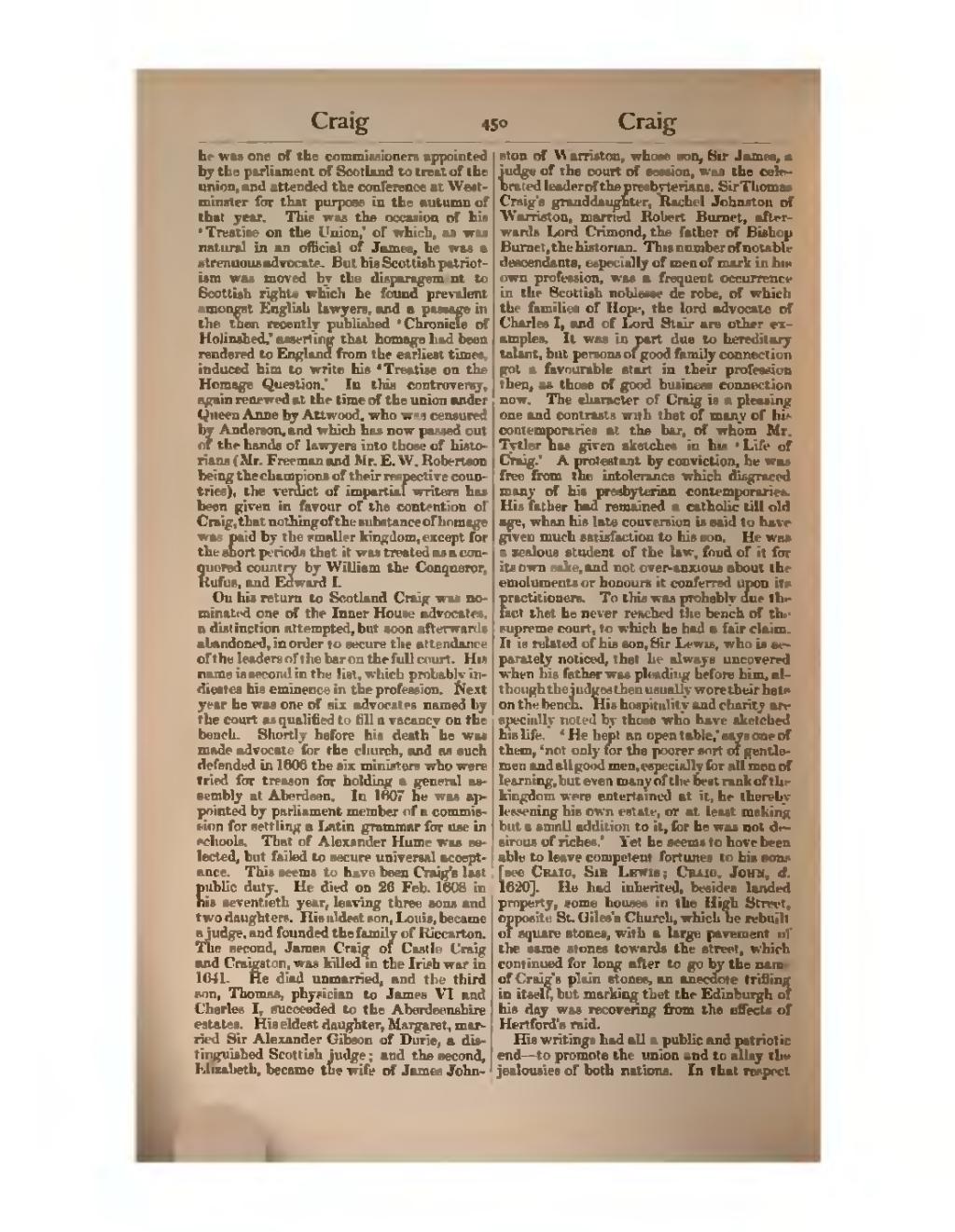he was one of the commissioners appointed by the parliament of Scotland to treat of the union, and attended the conference at Westminster for that purpose in the autumn of that year. This was the occasion of his ‘Treatise on the Union,’ of which, as was natural in an official of James, he was a strenuous advocate. But his Scottish patriotism was moved by the disparagement to Scottish rights which he found prevalent amongst English lawyers, and a passage in the then recently published ‘Chronicle of Holinshed,’ asserting that homage had been rendered to England from the earliest times, induced him to write his ‘Treatise on the Homage Question.’ In this controversy, again renewed at the time of the union under Queen Anne by Attwood, who was censured by Anderson, and which has now passed out of the hands of lawyers into those of historians (Mr. Freeman and Mr. E. W. Robertson being the champions of their respective countries), the verdict of impartial writers has been given in favour of the contention of Craig, that nothing of the substance of homage was paid by the smaller kingdom, except for the short periods that it was treated as a conquered country by William the Conqueror, Rufus, and Edward I.
On his return to Scotland Craig was nominated one of the Inner House advocates, a distinction attempted, but soon afterwards abandoned, in order to secure the attendance of the leaders of the bar on the full court. His name is second in the list, which probably indicates his eminence in the profession. Next year he was one of six advocates named by the court as qualified to fill a vacancy on the bench. Shortly before his death he was made advocate for the church, and as such defended in 1606 the six ministers who were tried for treason for holding a general assembly at Aberdeen. In 1607 he was appointed by parliament member of a commission for settling a Latin grammar for use in schools. That of Alexander Hume was selected, but failed to secure universal acceptance. This seems to have been Craig's last public duty. He died on 26 Feb. 1608 in his seventieth year, leaving three sons and two daughters. His eldest son, Lewis, became a judge, and founded the family of Riccarton. The second, James Craig of Castle Craig and Craigston, was killed in the Irish war in 1641. He died unmarried, and the third son, Thomas, physician to James VI and Charles I, succeeded to the Aberdeenshire estates. His eldest daughter, Margaret, married Sir Alexander Gibson of Durie, a distinguished Scottish judge; and the second, Elizabeth, became the wife of James Johnston, whose son, Sir Archibald of Warriston, judge of the court of session, was the celebrated leader of the presbyterians. Sir Thomas Craig's granddaughter, Rachel Johnston of Warriston, married Robert Burnet, afterwards Lord Crimond, the father of Bishop Burnet, the historian. This number of notable descendants, especially of men of mark in his own profession, was a frequent occurrence in the Scottish noblesse de robe, of which the families of Hope, the lord advocate of Charles I, and of Lord Stair are other examples. It was in part due to hereditary talent, but persons of good family connection got a favourable start in their profession then, as those of good business connection now. The character of Craig is a pleasing one and contrasts with that of many of his contemporaries at the bar, of whom Mr. Tytler has given sketches in his ‘Life of Craig.’ A protestant by conviction, he was free from the intolerance which disgraced many of his presbyterian contemporaries. His father had remained a catholic till old age, when his late conversion is said to have given much satisfaction to his son. He was a zealous student of the law, fond of it for its own sake, and not over-anxious about the emoluments or honours it conferred upon its practitioners. To this was probably due the fact that he never reached the bench of the supreme court, to which he had a fair claim. It is related of his son, Sir Lewis, who is separately noticed, that he always uncovered when his father was pleading before him, although the judges then usually wore their hats on the bench. His hospitality and charity are specially noted by those who have sketched his life. ‘He kept an open table,’ says one of them, ‘not only for the poorer sort of gentlemen and all good men, especially for all men of learning, but even many of the best rank of the kingdom were entertained at it, he thereby lessening his own estate, or at least making but a small addition to it, for he was not desirous of riches.’ Yet he seems to have been able to leave competent fortunes to his sons [see Craig, Sir Lewis; Craig, John, (d. 1620)]. He had inherited, besides landed property, some houses in the High Street, opposite St. Giles's Church, which he rebuilt of square stones, with a large pavement of the same stones towards the street, which continued for long after to go by the name of Craig's plain stones, an anecdote trifling in itself, but marking that the Edinburgh of his day was recovering from the effects of Hertford's raid.
His writings had all a public and patriotic end—to promote the union and to allay the jealousies of both nations. In that respect

